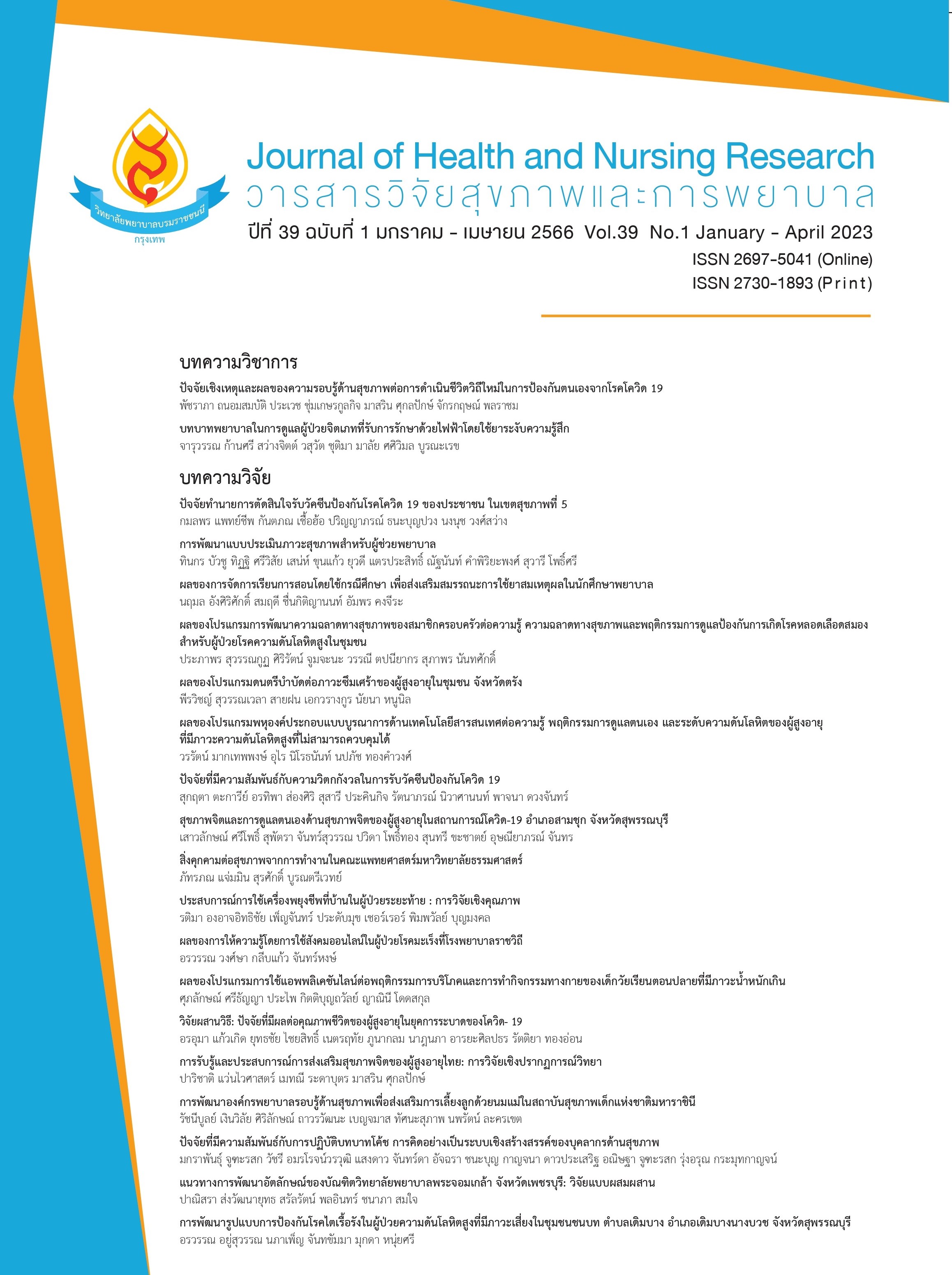ผลของโปรแกรมดนตรีบำบัดต่อภาวะซึมเศร้าของผู้สูงอายุในชุมชน จังหวัดตรัง
คำสำคัญ:
ภาวะซึมเศร้า , ดนตรีบำบัด , ผู้สูงอายุ, ชุมชนบทคัดย่อ
บทนำ: ภาวะซึมเศร้าในผู้สูงอายุมีอุบัติการณ์สูงขึ้นอย่างต่อเนื่อง ซึ่งหนึ่งในวิธีบำบัดที่ไม่ใช้ยา คือ การใช้ดนตรีบำบัดที่ผสมเสียงที่มีความเป็นธรรมชาติร่วมกับคลื่นดนตรีที่มีความถี่เท่ากับคลื่นสมอง ส่งผลให้มีการตอบสนองภายในจิตใจจนเกิดการเปลี่ยนแปลงทางอารมณ์ นำไปสู่ภาวะซึมเศร้าลดลง และมีสุขภาพจิตที่ดีขึ้น
วัตถุประสงค์การวิจัย: เพื่อเปรียบเทียบคะแนนเฉลี่ยภาวะซึมเศร้าของผู้สูงอายุกลุ่มทดลองก่อนและหลังได้รับดนตรีบำบัด และเปรียบเทียบคะแนนเฉลี่ยภาวะซึมเศร้าของผู้สูงอายุระหว่างกลุ่มทดลองและกลุ่มควบคุมก่อนและหลังได้รับดนตรีบำบัด
ระเบียบวิธีวิจัย: การวิจัยกึ่งทดลองนี้ กลุ่มตัวอย่างเป็นผู้สูงอายุที่มีภาวะซึมเศร้าระดับเล็กน้อยถึงปานกลาง ในเขตพื้นที่ของหน่วยบริการสุขภาพระดับปฐมภูมิ จังหวัดตรัง 80 ราย แบ่งเป็นกลุ่มควบคุม และกลุ่มทดลอง กลุ่มควบคุมได้รับคำแนะนำตามปกติ ส่วนกลุ่มทดลองได้รับโปรแกรมดนตรีบำบัดวันละ 1 ครั้ง ครั้งละ 30 นาที 4 สัปดาห์ เครื่องมือการวิจัย คือ แบบสอบถามข้อมูลส่วนบุคคล แบบวัดภาวะซึมเศร้าในผู้สูงอายุของไทย คู่มือการใช้ และไฟล์ดนตรี วิเคราะห์ข้อมูลด้วยความถี่ ร้อยละ ค่าเฉลี่ย ส่วนเบี่ยงเบนมาตรฐาน และสถิติทีอิสระ
ผลการวิจัย: พบว่า ผู้สูงอายุที่ได้รับโปรแกรมมีคะแนนเฉลี่ยภาวะซึมเศร้าหลังทดลอง (M=12.32, SD=1.69) ลดลงกว่าก่อนทดลอง (M=16.53, SD=2.12) อย่างมีนัยสำคัญทางสถิติที่ระดับ .05 หลังการทดลองพบว่ากลุ่มที่ได้รับโปรแกรมมีคะแนนเฉลี่ยภาวะซึมเศร้า (M=12.32,SD=1.69) ต่ำกว่ากลุ่มที่ได้รับการพยาบาลตามปกติ (M=15.82, SD=2.06) อย่างมีนัยสำคัญทางสถิติที่ระดับ .001
สรุปผล: การนำโปรแกรมดนตรีบำบัดไปใช้จริงในชุมชนทำให้ผู้สูงอายุมีภาวะซึมเศร้าลดลงได้จริง
ข้อเสนอแนะ: ผู้ดูแลควรนำดนตรีบำบัดมาใช้เพื่อลดภาวะซึมเศร้าสำหรับผู้สูงอายุที่มีภาวะซึมเศร้าระดับเล็กน้อยถึงปานกลาง ทั้งนี้ต้องคำนึงถึงความชอบฟัง และประเภทของดนตรีในแต่ละบุคคลก่อนแนะนำการใช้
Downloads
เอกสารอ้างอิง
World Health Organization (WHO). Depression Mental health. https://www.who.int/mental_health/management/depression; 2020.
Department of Mental Health, Ministry of Public Health. Guidelines Promote mental health and prevention of mental health problems in the elderly for community hospitals and sub-district health promotion hospitals. Bangkok: The National Buddhism Office Printing House; 2019. (in Thai).
Foundation of Thai Gerontology Research and Development Institute. Situation of Thai Elderly. Nakhon Pathom: Printery. Royal College of Pediatricians of Thailand; 2016. (in Thai).
Mosikanon K Effects of a program of music therapy combined with social support on depression among the elderly with Parkinson's disease. Journal of the Nursing Council. 2016; 31(1), 44-55. (in Thai).
Thongcharoen W. Science and art of nursing for the elderly. (2nd printing).Bangkok: NP Press Partnership; 2015. (in Thai).
Department of Mental Health, Ministry of Public Health. Know about depress ion. Retrieved January 2, 2019 from www.dmh.go.th/news/view.asp?id=1037. (in Thai).
Srisanprang P. Depression in the Elderly: Profound Nursing: Depression in older persons: Comprehensive nursing. Journal of Nursing Science & Health year 2018;41(1),129-40. (in Thai).
Murrock & Higgins. The theory of music, mood and movement to improve health outcomes: Discussion paper. Rehabilitation Psychology 2009;45(3), 274-83.
Polit and Hungler. Nursing research: Principles and methods (6th ed). Philadelphia: Lippincott.Sperber, A. D. (2004). Translation and validation of study instruments for cross- cultural research.American Gastroenterology Association. 2019; 126(1) , 124-8. doi:10.1053/j. gastro.2003.10.016. Szwajcer, E. M., Hiddink, G. J., Koelen, M. A., and van Woerkum, C.
Charoenphaet P. Impact of Co-Application of Music Therapy and Social Support on Depression in Elderly Parkinson’s Disease Patients. Journal of the Nursing Council. Bangkok 2016; 31(1) 44-55. (in Thai).
Aekwarangkoon S and Noonil N. Lived experiences of severe depression and suicide attempts in older Thai-Muslims living in rural communities. Pacific Rim International Journal of Nursing Research 2018;23(4), 334-44. (in Thai).
Hongsrisuwan N. Depression. Journal of KU. Academic Affairs 2016;19(38), 105-18. (in Thai).
Health Systems Research Institute. Knowledge management and synthesis of guidelines for Sub-District Health Promoting Hospitals: Guidelines for the Treatment of Depression and People at Risk To suicide . [Internet]. 2021 [Cited 2021 april]. Available from: https://kb.hsri.or.th/dspace/handle/11228/3095. (in Thai).
Muangkhwa P, Klongdee K and Chaniang S. Depression in Thai Students: An Important Role for Students. Academy. Nursing Science Journal Siam University. 2020;21(41):104-116. (in Thai).
Holler, Kavanaugh and Cook. (2014). Executive functioning in adolescent depressive disorders. Journal of Child and Family Studies, 23(8) , 1315-24. http://www.habitsmart.com/dep.html
Bulechek, Butcher and Dochterman. (2008). Nursing Interventions Classification (NIC) - Elsevier eBook on VitalSource, 7th Edition.[Doctoral dissertation].
ดาวน์โหลด
เผยแพร่แล้ว
รูปแบบการอ้างอิง
ฉบับ
ประเภทบทความ
สัญญาอนุญาต
ลิขสิทธิ์ (c) 2023 วารสารวิจัยสุขภาพและการพยาบาล (วารสารวิทยาลัยพยาบาลบรมราชชนนี กรุงเทพ)

อนุญาตภายใต้เงื่อนไข Creative Commons Attribution-NonCommercial 4.0 International License.
บทความที่ได้รับการตีพิมพ์ เป็นลิขสิทธิ์ของวารสารวิจัยสุขภาพและการพยาบาล (วิทยาลัยพยาบาลบรมราชชนนี กรุงเทพ) ไม่สามารถนำไปตีพิมพ์ซ้ำในวารสารฉบับอื่น


















